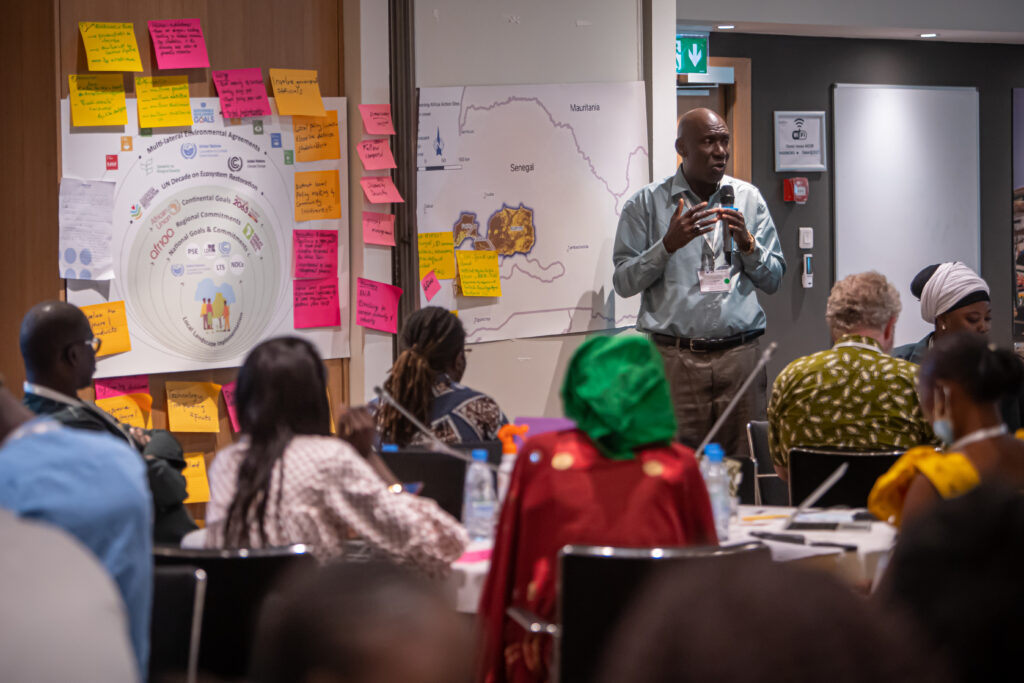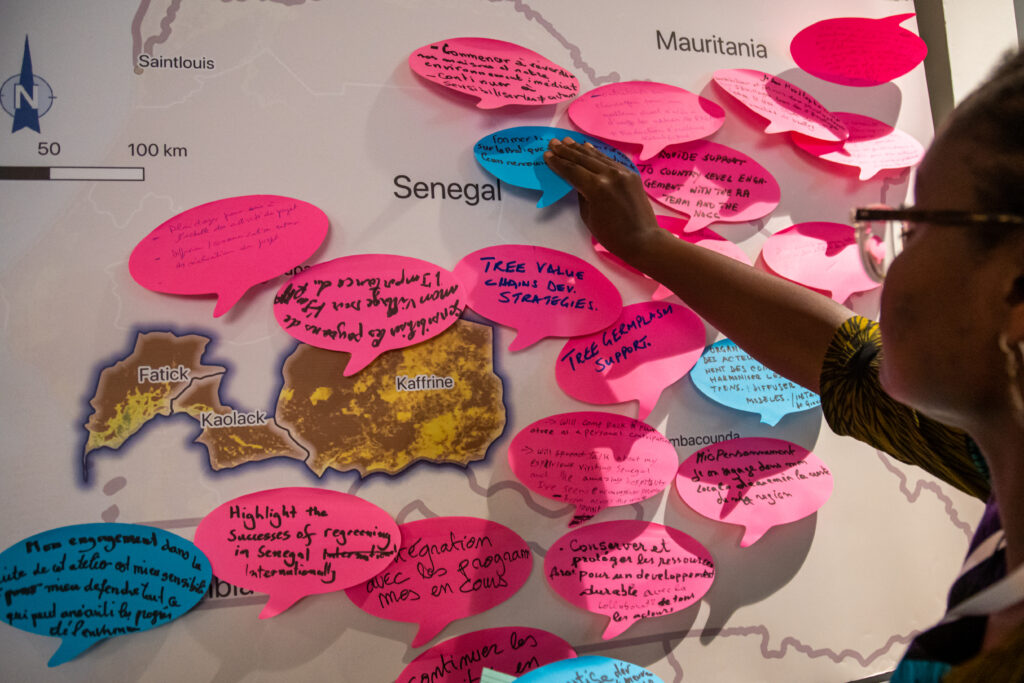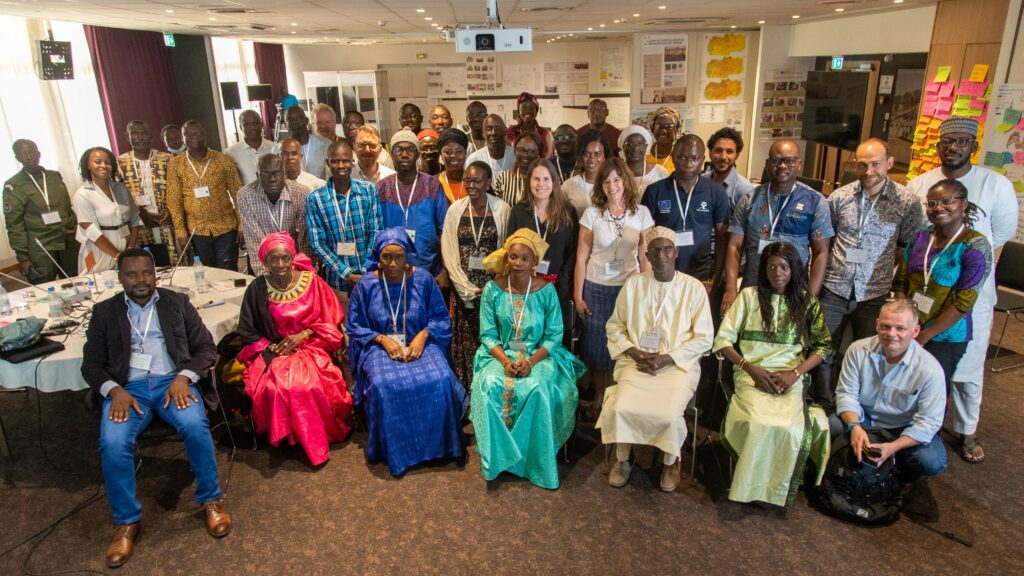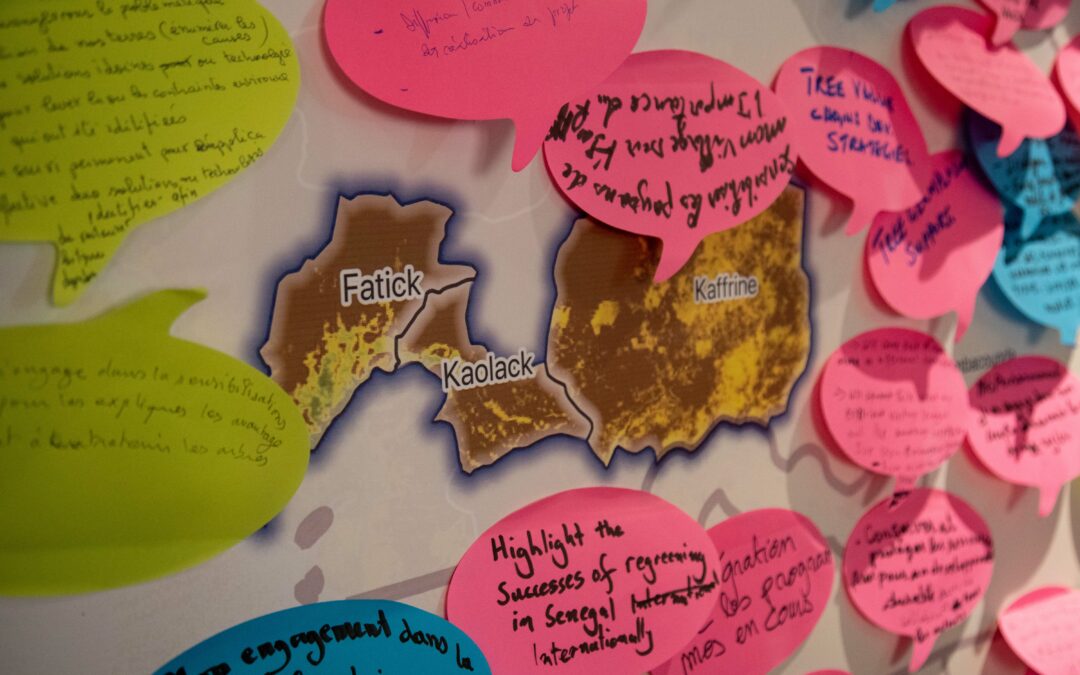By Sabrina Chesterman
“Land management has to go hand in hand with community needs – everyone has a role to play, and with our combined efforts, a lot of positive change can be achieved” – Marie Louise Diouf, Zonal Manager, World Vision Senegal
Senegal has achieved great success over the past five years in restoring its degraded landscapes through the Regreening Africa programme. A focus on Assisted Natural Regeneration (ANR), tree planting, nursery establishment, policy engagement, youth and gender inclusion, and community awareness, has resulted in more than 58,000 households being reached and more than 128,000 hectares of land under restoration.
A two-day workshop held earlier this year in June presented a key moment to applaud the Senegalese stakeholders and share lessons learnt from the country’s achievements to scale land restoration. Organized through the SHARED (Stakeholder Approach to Risk Informed and Evidence-based Decision-making) component, the national workshop “Regreening Africa: Inclusive and evidence-based approaches to accelerating land restoration in Senegal” brought together a wide range of stakeholders and partners across local, national, and regional levels to review and discuss the implications of the evidence and experience acquired over the five years of the Regreening Africa project in Senegal. The main objective of the workshop was to exchange information and to build a concrete road map for taking the lessons of Regreening Africa in Senegal forward. It also served to explore future European Union (EU) programming at the regional and national level, including the Great Green Wall initiative, and the Global EverGreening Alliance’s Restore program, among others.

A participant shares his ideas at the SHARED workshop in Senegal. Photo: Regreening Africa/KANDS Collective
“Regreening Africa is aligned to the national initiatives that Senegal has taken on to fight land degradation, including the National Plan to Combat Desertification, the national strategic investment framework for sustainable land management, African Forest Restoration Initiative a country-led effort to restore 100 million hectares of African land by 2030 (AFR100) and, recently, the Green PSE Plan for Sustainable Reforestation of the National Territory.” – Colonel Major Seydi Beye, Directorate of Water and Forests, Ministry of Environment
One of the unique aspects of the SHARED workshop was an evidence and experience “wall”. This served as a physical space to allow participants to share their experiences through an interactive and engaging process, and jointly reflect on the evidence and data presented on the project’s achievements, challenges and key lessons. Maps, graphs, images, and – importantly – testimony from community members and farmers were collaboratively reviewed to generate key messages and aspects to take forward land restoration in Senegal.

Comments from SHARED workshop participants. Photo: Regreening Africa/KANDS Collective
To further build on Regreening Africa’s achievements, participants highlighted key components that land restoration stakeholders in Senegal should collectively sustain and enhance:
- Continue to develop and nurture partnerships with and inclusion of all stakeholders to allow for diversity of ideas.
There is still a lack of coordination and synergies between land restoration and ANR actors at various levels. The partnerships Regreening Africa developed with other projects and programs to harmonize interventions and establish a memorandum of understanding are key to reaching all actors at grassroots level.
- Tailor restoration interventions to existing conditions
To ensure success, restoration interventions should be tailored to existing conditions in Senegal, using monitoring and evaluation data.
“Before the arrival of the project, conflict was intense. Due to intense awareness raising among key stakeholders, corridors have been established to ensure peace among farmers and herders. Grazing corridors not only help with peace but also restoration.” – Hilda Kegode, Monitoring, Evaluation and Learning
- Up-scale policies that have demonstrated success, and revise those that have not produced the desired outcomes.
To effectively do so, the input from the community implementing the project needs to be considered, and the technicians at the grassroots level should advise on the policies and create synergies between various departments.
“In Senegal, there is a lot of potential to reach people. We need to optimize organize exchanges between new and experienced practitioners so that the latter can see the benefits of good greening practices.” – Samba Sow, Economics of Land Degradation
- Let Regreening data inform decision making.
The Regreening app has provided information to more than 13,000 Senegalese households. This data needs to inform decision making and be integrated back into the Regreening Africa work for it to be meaningful.
“One of the main achievements is the Regreening app, which monitors the progress of regreening activities. If scaled up, this will be a step towards regreening the country.” – Colonel Major Seydi Beye, Directorate of Water and Forests, Ministry of Environment
- Allow the Senegalese to own the trees they plant and grow.
Favorable government policies on land and tree tenure are the final cog in a successful restoration wheel. People must be allowed to own the trees they plant and grow. Knowing they stand to gain maximum benefits from their successes, those who plant the trees are bound to care for them too.
Regreening Africa used several mechanisms to enable the scaling of land restoration. One achievement has been mainstreaming the new forestry code through community sensitization. This has resulted in village committee structures being created, formalized and leading local action plans to sustainably manage natural resources. Trust and peaceful relationships between forestry agents and community members have subsequently been improved.
“Trees provide fruit and nuts, which improve livelihoods and nutrition. Trees also supply firewood.”
A focus on these points listed above will not only contribute to global commitment to restore ecosystems, combat climate change and further sustainable development but also help achieve local aspirations for improved livelihoods and food security.
As the workshop ended, everyone in attendance reaffirmed their commitment to land restoration and realizing the vision for a prosperous Senegal. This commitment was aptly articulated by the Marie Louise Diouf, Zonal Manager, World Vision Senegal: “We want a better world for the children we serve, and you cannot have a better world if nature is destroyed. World Vision is committed to assisting the state in these reforestation efforts.”

A group photo of the SHARED workshop participants in Senegal. Photos: Regreening Africa/KANDS Collective
The successful adoption of agroforestry on a large scale depends not only on appropriate technologies but also on a supportive political, legal, and institutional environment. To this end, Regreening Africa organized a trip to Niger for local Senegalese decision makers and political actors to learn about how policy influence led to Niger’s ANR presidential decree and improved the widescale adoption and scaling of land restoration. This will contribute to further exploring advocacy opportunities to promote incentive based ANR policies and practices.
Regreening Africa is a five-year European Union-funded project that aims to reverse land degradation in 500,000 households and 1 million hectares across eight countries by incorporating trees into agricultural and pastoral landscapes.
More information on the Regreening Africa project in Senegal and the workshop resources can be accessed here.
This story was produced with the financial support of the European Union. Its contents are the sole responsibility of Regreening Africa and do not necessarily reflect the views of the European Union.

